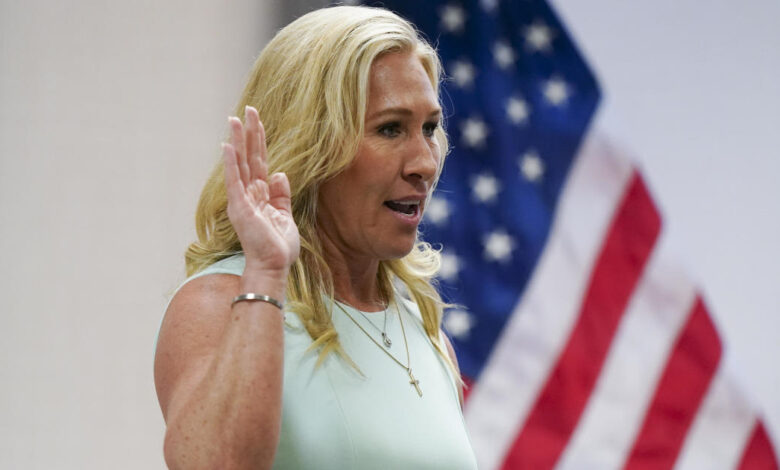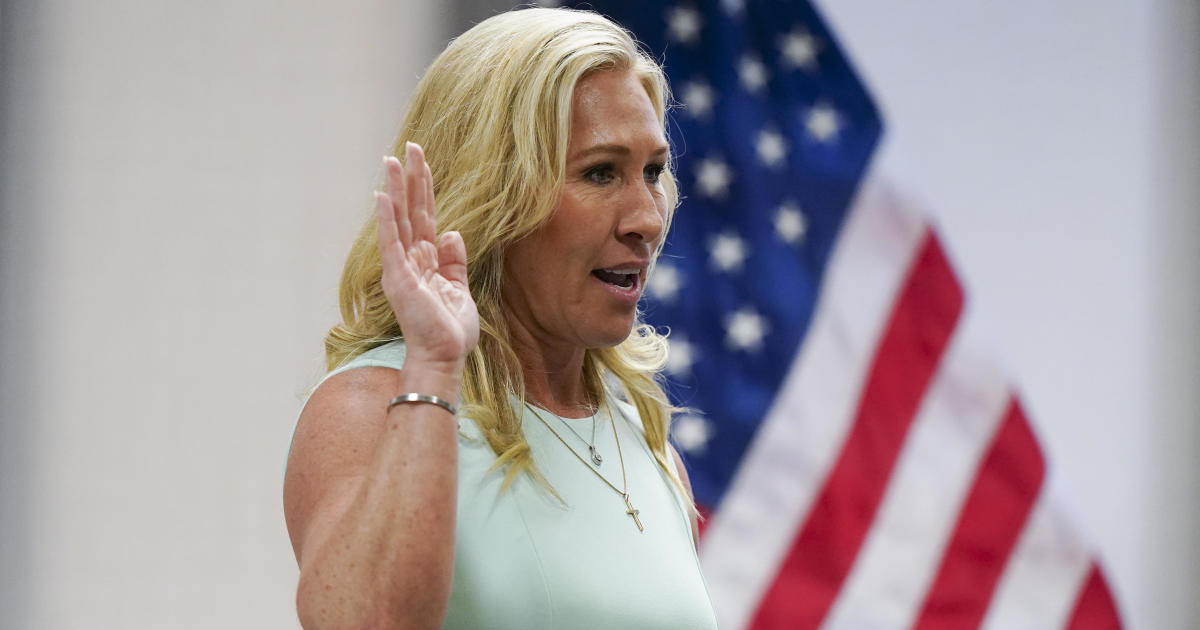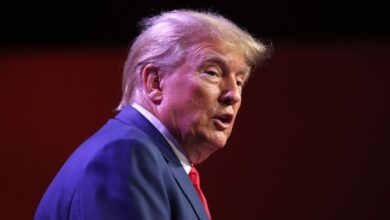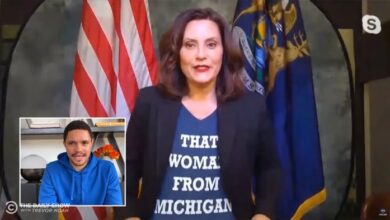
Texts Show Marjorie Taylor Greene Asked Meadows About Martial Law
Texts Show Marjorie Taylor Greene Asked Meadows About Martial Law, a revelation that has sent shockwaves through American politics. The messages, allegedly exchanged between Greene, a Republican Congresswoman, and Mark Meadows, former White House Chief of Staff, have sparked a firestorm of controversy.
These texts, if verified, paint a disturbing picture of attempts to overturn the 2020 election results and potentially implement martial law, raising serious questions about the integrity of American democracy and the actions of those in power.
The texts, which reportedly date back to the period following the 2020 election, contain language suggesting a concerted effort to challenge the results. Greene, a vocal supporter of former President Donald Trump, has been a prominent figure in the movement to overturn the election, and the texts seem to corroborate her involvement in these efforts.
The implications of these messages, if verified, are far-reaching, potentially impacting the legal and political landscape of the United States for years to come.
Context and Background

The 2020 US presidential election was a highly contentious event, marked by unprecedented levels of polarization and distrust. The election was closely contested, with former Vice President Joe Biden ultimately emerging victorious over incumbent President Donald Trump. However, Trump and his supporters repeatedly made unsubstantiated claims of widespread voter fraud, alleging that the election had been stolen from him.
These allegations fueled a climate of political unrest and tension, culminating in the January 6, 2021 attack on the US Capitol by a mob of Trump supporters seeking to overturn the election results. This event further deepened the political divide in the country and raised concerns about the fragility of American democracy.
Marjorie Taylor Greene’s Political Stance
Marjorie Taylor Greene, a Republican congresswoman from Georgia, is known for her outspoken views and her staunch support of Donald Trump. She has been a vocal proponent of the unfounded claims of election fraud and has publicly expressed support for the January 6th attack on the Capitol.
Greene has also promoted QAnon conspiracy theories, which allege that a cabal of Satan-worshipping pedophiles is running a global child sex-trafficking ring and that Trump is fighting against them. These views have been widely condemned as dangerous and have led to calls for her removal from Congress.
The texts showing Marjorie Taylor Greene asking Mark Meadows about martial law, while concerning, seem to be reflecting a larger trend. A recent CBS News poll found that more Americans view the Republican Party as extreme and the Democratic Party as weak, suggesting a growing polarization in American politics.
This polarization likely contributes to the anxieties and beliefs that fueled Greene’s questions, and it’s a worrying sign for the future of our democracy.
Mark Meadows’ Role as White House Chief of Staff
Mark Meadows served as White House Chief of Staff to President Donald Trump from March 2020 to January 2021. In this role, he was a key advisor to Trump and played a significant role in shaping the administration’s response to the COVID-19 pandemic and other major issues.
The texts showing Marjorie Taylor Greene asking Meadows about martial law are just the tip of the iceberg. The January 6th Committee is set to unveil a mountain of new evidence in their first televised hearing, which is sure to shock the nation.
The committee claims to have evidence of a coordinated effort to overturn the election results , and the texts from Greene to Meadows only reinforce the seriousness of the situation. It’s going to be a wild ride, and I’m sure we’ll all be glued to our screens.
Meadows was a close confidante of Trump and was known for his loyalty and willingness to implement the president’s agenda. He was also involved in the administration’s efforts to challenge the election results, including the pressure campaign on state officials to overturn the vote.
The Alleged Texts
The texts allegedly exchanged between Marjorie Taylor Greene and Mark Meadows, the former White House Chief of Staff, surfaced as part of the January 6th Committee’s investigation into the attack on the Capitol. These texts, which were obtained by the committee, have become a subject of intense scrutiny and debate, shedding light on the efforts to overturn the 2020 presidential election.The texts reveal a series of communications between Greene and Meadows in the weeks leading up to and following the January 6th attack.
These exchanges highlight a shared desire to challenge the election results and explore ways to keep President Donald Trump in power.
The texts showing Marjorie Taylor Greene asking Meadows about martial law are a stark reminder of the fragility of our democracy. It’s important to remember that effective leadership, like the kind discussed in the science of coaching teachers edsurge news , is crucial for navigating challenging times.
This incident underscores the need for strong leadership and a commitment to upholding democratic values.
Language Used in the Texts
The texts reveal a concerning use of language, particularly the invocation of “martial law” and the desire to “overturn the election.” These phrases, when used in the context of the events surrounding the January 6th attack, carry significant weight and raise serious concerns about the potential for illegal and unconstitutional actions.
“Mark, I am so worried about the election. I think we need to have martial law. We need to overturn the election.”
This text, allegedly sent by Greene to Meadows, exemplifies the alarming nature of their communications. The use of “martial law” suggests a willingness to suspend civil liberties and potentially employ military force to achieve political ends. The phrase “overturn the election” demonstrates a clear intent to disregard the democratic process and undermine the legitimacy of the election results.
Context and Timing of the Texts
The timing of these texts is crucial to understanding their significance. The texts were exchanged in the immediate aftermath of the 2020 presidential election, during a period of intense political turmoil and widespread allegations of voter fraud. These allegations, which were ultimately debunked by numerous courts and officials, fueled a climate of distrust and anger among Trump supporters.The texts also shed light on the role of Meadows and Greene in the efforts to overturn the election.
They appear to have been actively involved in discussions about challenging the results and exploring alternative paths to keep Trump in power. The texts provide a glimpse into the inner workings of a campaign to undermine the democratic process, a campaign that ultimately culminated in the attack on the Capitol.
Potential Implications
The alleged texts, if verified, could have significant legal and political ramifications. The potential impact on public trust and faith in the electoral process is also a major concern. It’s crucial to analyze the potential consequences for both Marjorie Taylor Greene and Mark Meadows, including any potential legal repercussions.
Legal Ramifications
The texts, if authentic, could potentially be used as evidence in various legal proceedings. For example, they could be used in a criminal investigation into efforts to overturn the 2020 election results. The texts could also be used in civil lawsuits alleging that the Trump administration engaged in illegal activities.
The Department of Justice (DOJ) has already launched an investigation into the January 6th Capitol riot, and the texts could be relevant to that investigation. Additionally, the House Select Committee investigating the January 6th attack has subpoenaed Meadows for documents and testimony, and the texts could be relevant to that investigation as well.
Impact on Public Trust
The alleged texts, if verified, could further erode public trust in the electoral process. This is especially true if the texts reveal that elected officials were involved in efforts to overturn the results of a legitimate election. The texts could also damage the public’s faith in the integrity of government institutions.
A recent poll found that 60% of Americans believe that the 2020 election was “fair and accurate,” but this number could decrease if the texts reveal evidence of election interference.
Consequences for Marjorie Taylor Greene and Mark Meadows
The alleged texts could have serious consequences for both Marjorie Taylor Greene and Mark Meadows. Greene could face censure or expulsion from Congress if the texts reveal that she was involved in efforts to overturn the election results. She could also face legal repercussions, including potential criminal charges.
Meadows could face similar consequences, including potential criminal charges for obstruction of justice or other crimes. Additionally, the texts could damage the reputations of both Greene and Meadows, making it difficult for them to continue their political careers.
Public Response and Reactions: Texts Show Marjorie Taylor Greene Asked Meadows About Martial Law
The news of the texts, which allegedly revealed a conversation between Representative Marjorie Taylor Greene and Mark Meadows about potentially invoking martial law after the 2020 election, sparked a wave of public reaction and debate. The public response was a complex tapestry of outrage, disbelief, and political maneuvering, with different political ideologies and affiliations expressing a range of views.
Public Reactions Across the Political Spectrum
The revelation of the texts generated a wide range of responses from individuals and organizations across the political spectrum.
- Democratswere quick to condemn Greene and Meadows, calling for investigations and even criminal charges. They viewed the texts as evidence of a dangerous attempt to overturn the results of a democratic election.
- Republicans, on the other hand, were more divided in their reactions. Some, like Representative Liz Cheney, condemned the texts and Greene’s actions, while others defended Greene and Meadows, arguing that they were simply exploring legal options.
- Independent voters, many of whom are disillusioned with both major political parties, expressed a mix of anger, concern, and skepticism. Some felt that the texts revealed a deeper level of political corruption and conspiracy, while others questioned the authenticity of the texts and the motives of those who leaked them.
Media Coverage and Public Discourse, Texts show marjorie taylor greene asked meadows about martial law
The media played a significant role in shaping public opinion about the texts.
- Liberal media outletstended to emphasize the potential illegality and danger of Greene and Meadows’ actions, while conservative outletsfocused on the potential for a “deep state” conspiracy to undermine Trump and his supporters.
- Social mediaalso became a battleground for public discourse, with users from across the political spectrum sharing their opinions and engaging in heated debates.
Key Themes and Arguments
The public discourse surrounding the texts highlighted several key themes and arguments.
- The legitimacy of the 2020 electionwas a central issue, with many arguing that the texts demonstrated a willingness to undermine the democratic process.
- The role of the mediain shaping public opinion was also a subject of debate, with some accusing the media of bias and others arguing that it was essential for holding those in power accountable.
- The potential for political violencewas another major concern, as some feared that the texts could incite further unrest and division in the country.
Summary
The revelations of these texts have reignited debates about election integrity and the role of social media in spreading misinformation. They have also brought into focus the potential consequences of political leaders who seek to undermine democratic processes. As the public continues to grapple with the implications of these messages, the future of American politics and the integrity of its elections remain uncertain.
It remains to be seen whether these texts will lead to legal action or further erode public trust in the government. One thing is certain: the impact of these texts will be felt for years to come.






